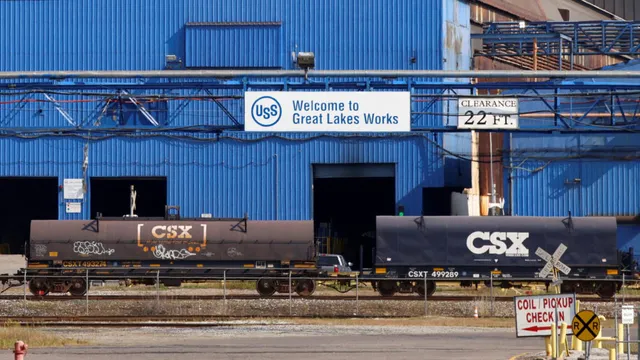
Shigeru Ishiba calls on Biden to address Nippon Steel's acquisition concerns
2025-01-15 12:04- The Biden administration extended the deadline for Nippon Steel to acquire U.S. Steel to June 18, 2025.
- Concerns were raised by Japanese Prime Minister Shigeru Ishiba regarding the implications of Biden's decision for trade relations.
- The extension gives the involved companies time to challenge the acquisition's block in court and potentially negotiate new terms.
Express your sentiment!
Insights
In the United States, the bid by Nippon Steel to acquire U.S. Steel, which was initially blocked by President Joe Biden on national security grounds, received a new extension from the Biden administration, pushing the deadline to June 18, 2025. This decision came as a surprise amidst growing concerns within both the Japanese and U.S. business communities regarding the acquisition's future. The original 30-day period mandated by Biden for the companies to abandon their transaction has been significantly lengthened, allowing the parties involved additional time to explore potential modifications that could facilitate the deal's approval. The postponement reflects a divided stance within the Committee on Foreign Investment in the United States (CFIUS), which could not reach a consensus on whether the acquisition posed a security threat to the nation. CFIUS, traditionally an entity that rarely denies foreign investment, now seems to be considering a second look at the transaction, likening this extension to a willingness to negotiate further regarding the deal's terms. Legal experts note that CFIUS's decision is an unusual step that suggests the current administration may be open to revisiting Biden's earlier block, depending on a thorough examination of the involved parties’ arguments. The context surrounding this issue has also prompted formal discussions, with Japanese Prime Minister Shigeru Ishiba raising concerns with Biden during a negotiation session that featured economic security among other topics. Ishiba stressed the importance of ensuring stability in partnerships among allies to maintain vibrant supply chains. He pointed specifically to the Nippon Steel and U.S. Steel deal as a pivotal factor, likely to bolster economic security while enhancing foreign investments in the U.S. steel industry. While political sentiments towards foreign acquisitions remain mixed, the bid's supporters argue that Nippon Steel's investment is crucial for modernizing aging facilities, ultimately strengthening the competitiveness of the American steel industry against global rivals, notably China. On the flip side, opposition to the deal emphasizes the potential risks associated with foreign ownership of critical infrastructure. As legal challenges and public scrutiny surrounding this proposed acquisition continue, the next steps taken by both companies and the Biden administration will be closely watched by stakeholders in both nations, as they determine the future landscape of U.S. industrial policy and multinational investments.
Contexts
The impact of foreign acquisitions on the U.S. economy is a multifaceted subject that warrants a careful examination of both potential benefits and drawbacks. Foreign direct investment (FDI), characterized by foreign companies acquiring U.S. firms, can enhance capital formation, spur innovation, and create job opportunities. When foreign firms invest in local businesses, they may bring advanced technologies, management expertise, and access to global markets. This often leads to increased productivity and can bolster competitiveness for domestic companies. Furthermore, the influx of foreign capital can boost local economies, leading to higher expenditure in various sectors, thus stimulating economic growth at both state and national levels. However, the implications of foreign acquisitions are not uniformly positive. One of the primary concerns centers around potential job losses, particularly when consolidations lead to downsizing of the workforce or the relocation of operations overseas. Workers in the acquired firms may experience economic insecurity, and there could be a sense of dislocation within communities reliant on those jobs. Additionally, the motivations behind foreign acquisitions may not always align with domestic economic interests, as some investors might prioritize short-term profits over long-term investments conducive to sustainable economic growth. Another issue is the transfer of corporate control to foreign entities, which can lead to strategic sectors of the economy becoming vulnerable to foreign influence. Industries such as technology, energy, and finance are particularly sensitive due to national security considerations. Policymakers may express concern that essential innovations and critical resources could be exploited for non-domestic purposes, undermining the strategic autonomy of the United States. Balancing the benefits of foreign investment against these risks requires careful regulatory oversight to ensure that acquisitions serve the broader interests of the U.S. economy. The regulatory landscape surrounding foreign acquisitions has evolved in response to these dynamics. Agencies like the Committee on Foreign Investment in the United States (CFIUS) play a key role in reviewing transactions that might impact national security. The scrutiny aims to mitigate risks without stifling the benefits of legitimate FDI. In summary, while foreign acquisitions can contribute to economic vitality and modernization, they also pose challenges that necessitate ongoing vigilance from policymakers and stakeholders. A nuanced understanding of these impacts is essential for fostering an economic environment that maximizes benefits while safeguarding national interests.